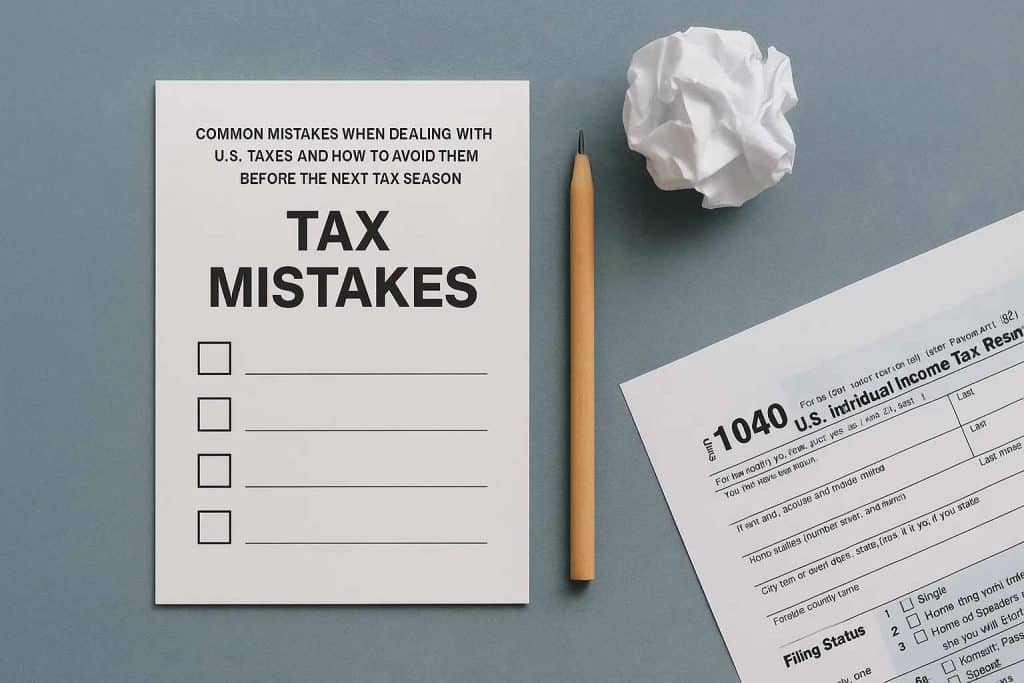Navigating U.S. tax laws can be a daunting task, especially with the array of potential pitfalls one might encounter. However, armed with the right tips and insights, you can confidently approach tax season without fear.
This guide sheds light on common errors made during the tax process, offering strategies to avoid them and ensure your returns are accurate and hassle-free. By understanding these issues, taxpayers can gain better control over their financial lives, saving both time and money in the long run.
Common filing mistakes taxpayers make

While filing, it’s careless mistakes that often trip people up. These range from simple arithmetic errors to more complicated issues like incorrect social security numbers. Mistakes, even minor ones, could lead to processing delays and potential audits. It’s crucial to double-check all information before submitting your returns. Taking the time to review the most recent guidelines issued by the IRS can further prevent misunderstandings and errors.
A lack of understanding about deductions can also complicate matters. Taxpayers sometimes miss out on eligible deductions simply because they aren’t aware of them. Research and keep track of available deductions throughout the year. Familiarize yourself with common deductions such as education expenses, home office deductions, and charitable donations to optimize your tax return.
Understanding the intricacies of credits and deductions
Tax credits can significantly impact your overall liability, but deciphering eligibility can be tricky. Unlike deductions, which lower taxable income, credits provide a dollar-for-dollar reduction in tax owed, making them highly valuable. Knowing the difference between refundable and non-refundable credits is essential.
Many taxpayers overlook credits for education, dependent care, or energy-efficient home improvements, which can lead to missed savings. Keep abreast of updates to tax laws each year to ensure you leverage every opportunity for tax reduction. Regularly reassessing your financial activities throughout the year can help identify potential tax credit opportunities, ensuring you’re prepared when tax season arrives.
The importance of record-keeping and thorough documentation
A systematic approach to organizing financial records is vital in preventing last-minute scrambles during filing season. Accurate record-keeping not only supports the figures you report but also provides evidence in the event of an audit. Start by maintaining clear records of your income, expenses, and any deductible activities. These should be categorized properly and stored securely for easy retrieval.
It’s recommended to hold onto these documents for at least three years, though some records, like real estate transactions, may need to be kept longer. Consider using digital tools to keep records up-to-date and accessible. Whether through spreadsheets or specialized software, ensure your system is comprehensive and user-friendly, enabling you to swiftly provide documentation if required by the IRS.
Practical strategies for efficient record management
Implementing effective strategies for financial management can alleviate stress and ensure readiness for tax filing. Start by establishing a dedicated space for organizing all receipts and financial documents. Label files by month or category to make retrieval straightforward. For those embracing technology, apps that scan and categorize receipts can save time and physical space.
Regularly update your records to avoid end-of-year panic. Set aside little time each month to review your financial activities, ensuring that nothing slips through the cracks. This habit not only aids tax preparation but also enhances your financial literacy and decision-making throughout the year. Ultimately, consistent management practices culminate in a smoother, more efficient tax filing process.
Navigating tax season with confidence
By recognizing and circumventing these common tax mistakes, you can approach tax season with assurance and control. Awareness, preparation, and organization are your best allies in avoiding financial missteps. As the next tax period approaches, apply these insights and suggestions to streamline the filing process.
With the right mindset and resources, you’ll not only avert potential penalties but also maximize your financial well-being. Engage proactively with your tax responsibilities, transforming what is often a stressful period into an opportunity for financial stability and peace.
